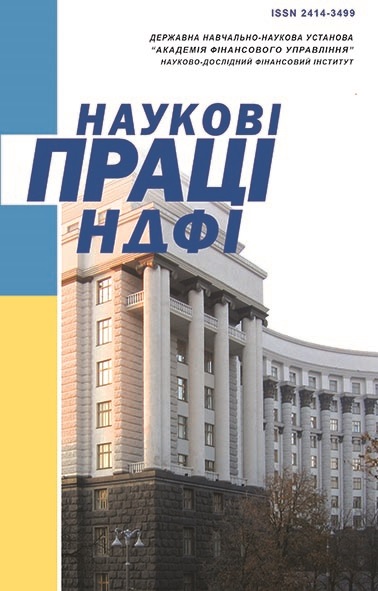
|
№ 4/2019№ 4/2019 | Nauk. pr. NDFI 2019 (4): 97–107https://doi.org/10.33763/npndfi2019.04.097 | FINANCIAL AND ECONOMIC REGULATION MEDVEDOVSKYI Denys 1 1SHEE “Kyiv National Economic University named after Vadym Hetman”
OrcID ID : https://orcid.org/0000-0002-5882-0269
Financial content management in the digital economy
This article deals with the influence of financial content management in the digital economy. The digital economy is characterized by the latest technologies. As the experience of some developed countries shows, digital technology has a significant impact on the financial system as a whole. The collection, management and publication of information in information sources is subject to content management. But financiers need to have considerable knowledge of the industry. This will allow them to skillfully manage the way information influences financial processes. The article addresses the next questions: the genesis of financial content management; the essence of this definition; connection between content and finance in the conditions of the digital economy; the emergence of the latest innovative technologies of the financial market and the impact of content on them; issues of protecting information from cyberthreats; the possibility of creating a separate discipline "Financial Content Management in the Digital Economy”. The key concepts of financial content management are identified. The main idea of financial content management is formulated. It is determined that content management and crowdfunding are connected. It is determined that cybercrime is dangerous in the financial environment. Given this, specific proposals on how to reduce the activation of cybercriminals in the financial and economic sector are made. It is substantiated that “financial content management” is necessary in the work of financiers as an integral part of “financial management”, which is caused by the innovative nature of modern financial instruments. The main benefits of financial content management are a better creation of opportunities for innovation, more clearly defined requirements and criteria for management and financiers. Financial content management proposes a basic understanding of techniques for adapting global international financial instruments to national financial markets, which is based on financial content management. Keywords: financial content management, financial management, content management, digital economy, crowdfunding JEL: G10, O39, Q55
Medvedovskyi D. . Financial content management in the digital economy / D. Medvedovskyi // Наукові праці НДФІ. - 2019. - № 4. - C. 97-107. | Article original in Ukrainian (pp. 97 - 107) | Download | Downloads :234 |
1. Rosenblatt, B., Dykstra, G. (2003). Integrating content management with digital rights management: imperatives and opportunities for digital content lifecycles. New York: Giant Steps.
2. Sowmiya, P., Shyamala, G. (2014). Survey of Web Content Management System, a Collaborative Environment for Online Community. International Journal of Advanced Research in Computer and Communication Engineering, Vol. 3, Iss. 11. doi.org/10.17148/IJARCCE.2014.31133
3. Drokina, N. I. (2018). Seo-optimization of the enterprise site as an internet marketing tool. Scientific Bulletin of Uzhhorod National University.
Series: International economic relations and world economy, Vol. 19, Iss. 1, 127–132 [in Ukrainian].
4. Chyrun, L., Vysotska, V. (2016). Online newspaper content analysis based seo technologies. Bulletin of the Lviv Polytechnic National University. Series: Computer-aided design systems. Theory and practice, 859, 3–16.
5. Lytvyn, V. V., Vysotska, V. A., Kuchkovskyi, V. V., Dutkevych, S. Yu., & Naum, O. M. (2018). Method of integration and content management of tourism information resources network according to end user needs. Bulletin of the Lviv Polytechnic National University. Series: Information systems and networks, 901, 22–36 [in Ukrainian].
6. Microsoft. (2019). AppSource. Retrieved from appsource.microsoft.com/uk-UA.
7. Kapitzke, C. (2003, November 4). Search Engine Anatomy: The industry and its commercial structure. Retrieved from pdfs.semanticscholar.org/6c5d/a1e0513c5ba6dbdd7c8aaa722a9aabb28251.pdf.
8. Artomov, I. V. (2016). Innovation in higher education: current aspects. Uzhhorod [in Ukrainian].
9. Deloitte. (2018). Private financial technologies as a tool for sustainable business development in Russia and Kazakhstan. Financial Technology Trends. Retrieved from www2.deloitte.com/content/dam/Deloitte/ru/Documents/research-center/Chastnye-finansovye-tekhnologii-kak-instrument-ustojchivogo-razvitiya-biznesa-Rossii-Kazahstane.pdf [in Russian].
10. Bloomberg. (2019, August 29). How the adoption and evolution of cloud technology are changing the fintech landscape. Retrieved from www.bloomberg.com/professional/blog/adoption-evolution-cloud-technology-changing-fintech-landscape/.
11. Integration. (n. d.). Merriam-Webster Dictionary. Retrieved from www.merriam-webster.com/dictionary/integration.
12. Calic, G. (2018). Crowdfunding. In The SAGE Encyclopedia of the Internet (pp. 112–114). SAGE Publications, Inc.
13. Kalnysh, Yu. H. (2015). Political default: nature of phenomenon and interpretation of scientific category. Bulletin of the National Academy of Public Administration under the President of Ukraine. Series: Political science, 4 (79), 31–37 [in Ukrainian].
14. Kuzmin, O. Ye., Kolisnyk, M. V., Oleksiv, I. B., & Ivasiuk, V. V. (2015). International Financial Management. Lviv: Vydavnytstvo Lvivskoi politekhniky [in Ukrainian].
|





